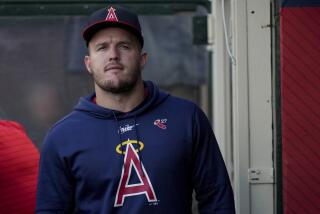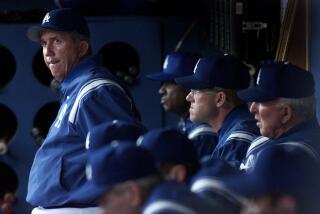BASEBALL / ROSS NEWHAN : 64TH ALL-STAR GAME : No Easy Escape for Ripken
- Share via
BALTIMORE — His locker is next to an exit in a far corner of the Baltimore Orioles’ clubhouse, occupied Monday and Tuesday by the American League All-Stars, of which he is a member for the 11th time.
The locker formerly belonged to his father, who was fired last winter after 36 years with the Orioles, and the almost private exit provides Cal Ripken Jr. with easy ins and outs.
The Orioles’ shortstop has often taken advantage of it during an increasingly difficult season. The commotion regarding his consecutive-games-played streak is growing, and, from it, there are no escapes, no easy ins and outs. Ripken is prisoner of a streak that has taken on a life of its own, he said Tuesday.
“I’ve always looked on myself as an unselfish, non-controversial player whose only goal has been to work hard and play every day,” Ripken said. “I find it amazing that the streak has evoked so many strong opinions and so much controversy.”
He has played almost every day for 11 years, a total of 1,823 consecutive games, and has moved to within 307 games of what had seemed an unreachable record, the 2,130 in a row by Lou Gehrig.
In an era when the slightest injury sends players to the bench to protect their multiyear contracts, Ripken seldom misses even infield practice.
He has shaken off the demands of his position and the rigors of modern-day scheduling and travel to provide All-Star stability in the middle of the Orioles’ infield and batting order.
He is as much Baltimore as a crabcake.
“The consummate example of dedication and application,” Oriole General Manager Roland Hemond said.
But it is not all a glory road.
The stress, pressure and hounding by fans and memorabilia collectors have turned Ripken into a virtual recluse when the Orioles travel, and he admits that he often wrestles with the claim by some that he would be an even better, more productive player, if he missed an occasional game.
The strongest criticism might have been from Bobby Bonds, the San Francisco Giants’ batting coach. He was quoted by the San Francisco Examiner as saying Ripken was costing the Orioles a pennant in his determination to break Gehrig’s record.
Ripken bristles when reminded of the quote, in which Bonds also accused him of being stupid.
“This has nothing to do with Gehrig, and everything to do with my view of baseball,” he said. “If I thought I was hurting the team, I’d sit down in a minute and have no regret about the streak. I mean, the streak is only a spinoff of my approach to the game.”
The criticism is loudest, of course, when the Orioles aren’t winning, Ripken isn’t hitting, or both. In the wake of his MVP season in 1991, when he was also MVP of the All-Star game, Ripken had career lows of 14 home runs and 72 runs batted in last year, and will start the second half of the ’93 season with a .229 batting average, 48 points below his career mark.
A 10-for-23 spurt during the final five games of the first half provided momentum just when Ripken was thinking of rejecting his victory in the fan vote at shortstop and passing on the All-Star game in the hometown in which he is revered.
“On the one hand, everybody wants to come into an All-Star game at his best, and I was embarrassed to be hitting .215,” he said. “On the other, I didn’t want to turn my back on the fans who had enough confidence in me to vote me in as a starter, and I also felt a certain responsibility to the city. I wouldn’t say I’m in a groove, but I do feel better about the way I’m hitting recently.”
Ripken has driven in 29 runs in his last 22 games and is on a pace to hit 24 homers with 90 RBIs, a quality year at any position, great for a shortstop.
Said Hemond: “The only time you hear any criticism about Cal is when he’s not hitting. It’s absurd. His statistics aren’t the only measure of what he means to the club.”
An Oriole vice president named Frank Robinson has come down from the front office recently to help Ripken with his stroke. There was a time when he could lean on his father, Cal Sr., or brother Bill--the second baseman was not offered a contract by the Orioles and is now with the Texas Rangers--for some built-in solace, help and inspiration.
Their departure has compounded the weight of the streak, much as the long contract negotiations--ultimately resolved at $30.5 million for five years--did in 1992.
The persistent questions regarding all of it, Ripken acknowledged, tend to beat him down. He seeks sanctuary in the players’ lounge or trainer’s room. He insulates himself by creating his own public-relations firm. He registers under fictitious names in hotels other than the ones the team stays at on the road, and uses a van service to get to and from the park.
“I’ve been portrayed as aloof, in hiding, not a team player,” Ripken said. “It’s over-dramatized, taken out of context.
“The streak seems to have become my identity, and I have to deal with it in every series in every city. The longer it goes and the bigger it becomes, the more it’s an issue of management for me.
“I mean, I have only so much concentration. I can’t use up 75% before I even get to the ballpark. I have to protect a certain amount of my privacy. I owe it to the club and myself.”
Said Hemond: “The other players recognize that Cal’s situation is different. He’s not out gallivanting or flaunting the freedom. He’s using the privacy to prepare for the game.”
It is a game--anywhere at any time--certain to have Ripken’s name in the lineup.
John Oates, the Baltimore manager and an All-Star coach, doesn’t believe Ripken needs a rest physically, pointing out that his energy level is so high that he often prepares for games by playing basketball in his basement gym and frequently stays long after games to lift weights.
Oates also said the situation is out of the manager’s hands.
“If the good Lord wants Cal to have an off day, he’ll let it rain,” Oates said. “Otherwise, if he stays healthy, he’ll break the record.”
Ripken doesn’t even have to be in top shape. He twisted a knee in a brawl with the Seattle Mariners June 6 and played the next night, after extensive therapy, making a key defensive play in the ninth inning.
He reflected Tuesday, long before the hometown crowd began its thunderous response to his All-Star introduction, and said of the emotions and controversy of the streak--the reactions he finds difficult to understand--that it has left him to wonder if his approach is wrong.
“Should I play or shouldn’t I? Is it too much of a grind mentally? Am I strong enough to handle it?” he said. “I’ve considered all kinds of things, and in the end I go out and play. In the end, I don’t feel I should have to apologize for wanting to play. In the end, I try to simplify it by working hard and fixing whatever hitting problems I have, because all the questions seem to develop when I’m not hitting.
“I realize that five years from now I may regret playing all of these games, but right now I’m taking them one at a time.”
More to Read
Go beyond the scoreboard
Get the latest on L.A.'s teams in the daily Sports Report newsletter.
You may occasionally receive promotional content from the Los Angeles Times.










